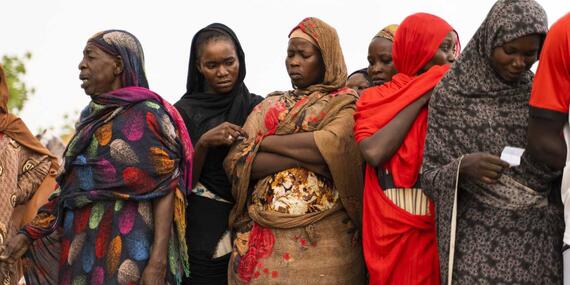"We simply, urgently and promptly need more resources to fund life-saving assistance" - UN Humanitarian Chief

Under-Secretary-General for Humanitarian Affairs and Emergency Relief Coordinator, Martin Griffiths - Remarks at the High-Level Pledging Event on Sudan and the Region
Excellencies, ladies and gentlemen,
Thank you all for being here on this important day.
I would like to add my thanks to the African Union and the Governments of Egypt, Germany, Qatar, the Kingdom of Saudi Arabia, and the European Union for co-hosting this critical and important event today.
The conflict that broke out in Sudan in mid-April has caused unbearable suffering for millions across the country.
Regrettably, the conflict is intensifying, particularly in Darfur, Khartoum, and Kordofan.
Escalating violence and casualties in Darfur are deeply concerning, particularly the hundreds reportedly killed in the Capital of West Darfur, El Geneina, in violence that appears to have an increasingly ethnic dimension.
We are similarly alarmed at reports of sexual violence in both Khartoum and Darfur. These criminal acts must end now.
Since the start of the conflict, more than 2.1 million people have fled the fighting. Close to half a million have crossed into neighboring countries, many of which are already facing their own humanitarian crises.
My colleague, High Commissioner for Refugees, Filippo Grandi, will speak more about the situation for those people and those host countries in a moment.
Excellencies, ladies and gentlemen,
Since my visit to Port Sudan in the first week of May, we have made progress in scaling-up the response to the needs incurred by this conflict.
Through intensive negotiations – anchored in the Declaration of Commitment – supported by our team in Jeddah under the organization of the Kingdom of Saudi Arabia and the United States, we have, as a result, coordinated at least 350 truck deliveries carrying more than 14,000 metric tonnes of life-saving assistance to different locations across Sudan, including 57 crossline deliveries.
More than 1.8 million people have received some form of assistance in these last two months.
We are progressively expanding our operational footprint to key hubs, particularly in Eastern Sudan.
Let me pause here, for a moment, to express my deepest gratitude and respect to all the aid workers, local organizations, civil society organizations and people who are putting their lives at risk to help others in Sudan. Thank you.
I pay special tribute to the families of the 11 aid workers who lost their lives in this conflict, in these weeks.
The role of civil society and local communities continues to be of critical importance. They are at the heart of the humanitarian response, as first responders, and our essential delivery partners. I thank them from the bottom of my heart.
We have allocated some $37 million through the Sudan Humanitarian Fund (SHF), administered by OCHA, to support the response by civil society partners who are delivering with great courage in priority areas.
Excellencies, ladies and gentlemen,
Violence, looting, and with a focus on the destruction and looting of humanitarian property, continues to hamper the humanitarian response.
In Darfur, we are having extraordinary difficulties in reaching the 8.6 million people in need of humanitarian aid and protection.
To expand access to people in all areas and to increase the flow of aid, we are actively exploring all modalities – including cross-border operations.
I call on the Sudanese authorities and those in neighbouring countries to continue to support, permit and facilitate these efforts.
And I urge the Sudanese authorities to urgently resolve pending visa applications and denied travel permits, these impediments to effective humanitarian assistance to their people.
Parties must continue and indeed improve their holding of the commitments agreed under the Jeddah Declaration.
We are in a race against time to preposition supplies before the onset of the rainy season, and to distribute seeds before the planting window closes. Seeds in the possession of the UN Food and Agriculture Organization, and which need to be delivered to their point of delivery.
If the fighting interferes with the planting season, of course, it will compound the already dire food security situation.
Excellencies, ladies and gentlemen,
In addition to causing immense suffering, this conflict is gutting the economy and sending the prices of basic goods soaring. Essential services, especially healthcare, are grinding to a halt in the worst affected areas.
So, my urgent asks today are as follows:
Our humanitarian appeals – for the response inside Sudan and the neighbouring countries – are significantly underfunded. With needs and operating costs soaring, we simply, urgently and promptly need more resources to fund life-saving assistance. And we know that we can deliver all that assistance were the funds to be made available.
To keep urgent humanitarian operations going, at this moment, I am allocating today an additional $22 million from the Central Emergency Response Fund to address priority needs. $25 million has already been allocated, from the Fund, to support humanitarian efforts in neighbouring countries, where I would like to draw attention to the fortitude as well as the needs of many host communities. Altogether, CERF has contributed $65 million to respond to the crisis this year, but we desperately need your help with additional flexible funding.
Excellencies, ladies and gentlemen,
Finally, the Sudanese people and the region urgently need an end to this conflict, as it has been said by all the speakers.
We are closely working with the African Union to support the implementation of the humanitarian component of the African Union Road Map for the Resolution of Conflict in Sudan.
The violence – causing so much suffering to civilians and damage to Sudan – must stop now.
I thank you.
